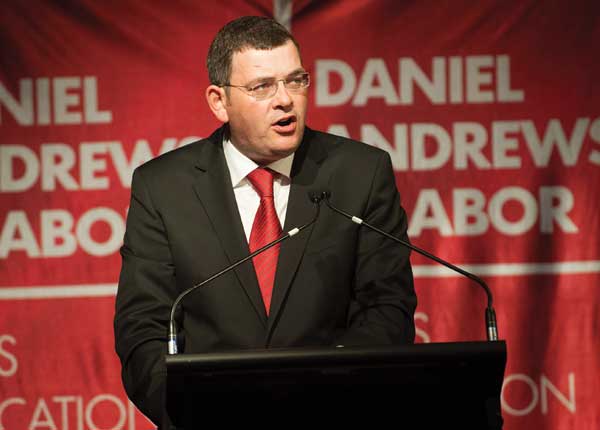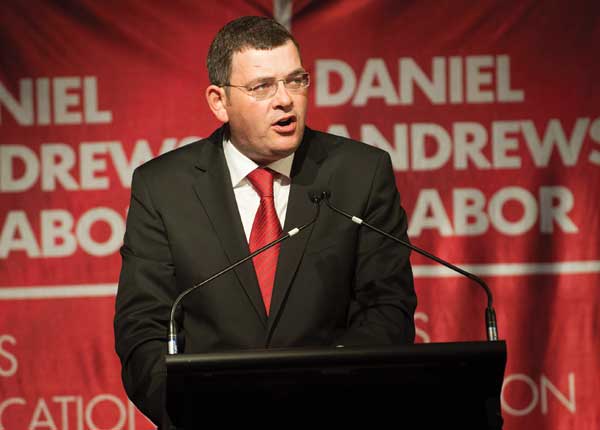

Councils in Victoria have slammed the state Labor Opposition’s populist bid to cap rates and force councils to request permission to raise rates above consumer price index (CPI).
The promise was made by Opposition Leader Daniel Andrews in a staple electoral tactic that echoes similar electoral pledges by other state opposition parties in Australia as a way to exploit hostile voter sentiment to the cost of council services.
His plan is reinforced by the belief that ratepayers have been ripped-off by local governments for services including water, gas and electricity, so his electoral promise is to give ratepayers a “fair go” by forcing councils to limit their rates at CPI.
If Labor wins government at the November 2014 election and subsequently implements this plan, it will mean putting $73 billion of community infrastructure at risk of facing “a future of disrepair”.
Mr Andrews said councils wishing to raise their rates above CPI must appeal to the Independent Essential Services Commission (ESC) and justify any rate increases.
He boldly proclaimed that under a Labor government, councils increasing their rates will be accountable for how they spend ratepayers’ money.
“The days of ratepayers footing the bill for Arnold Schwarzenegger impersonators are over,” Mr Andrews said.
But the Municipal Association of Victoria (MAV) wouldn’t let this go without resistance.
MAV President Bill McArthur said it was a “spectacular own goal” by Victorian Labor that at first glance may seem appealing to ratepayers, but the long-term consequences would wreak havoc for generations.
Mr McArthur accused Mr Andrews of effectively endorsing a “failed Kennett reform” that has hurt ratepayers for two decades.
“Voters thought Kennett’s rate rise restrictions in the early 1990s were a great idea until they felt the consequences of this reform. There is strong evidence that it severely damaged the development and liveability of all Victorian communities,” Mr McArthur said.
He explained that rate rise restrictions leave councils with two main choices – reduce services relied on by communities or reduce capital spending to maintain assets.
He pointed to the rate capping that has been frustrating councils in New South Wales since 1993, saying that national studies continue to show the quality of NSW local infrastructure is lower than other states as a consequence of years of rate capping.
“Kennett realised the error of his ways in 1997 when his government identified serious issues with the quality of local facilities across Victoria and introduced an infrastructure improvement program,” Mr McArthur said.
He said the Auditor General recently identified that Victorian councils’ annual $225 million asset renewal gap is projected to grow to $2.6 billion by 2026 without serious intervention.
The big rub for councils facing a renewal gap is that assets deteriorate faster than they can fund their maintenance, renewal and replacement costs.
“Over the past decade council rates have risen by $2.5 billion to $4.3 billion while State property taxes rose $2 billion to $4.8 billion and total State taxes grew by $5.7 billion to $15 billion. Will Daniel Andrews also limit State tax growth to CPI and require permission from an independent umpire?” Mr McArthur said.
He said councils could save more than half a billion dollars this year if ratepayers didn’t need to keep stepping in to rescue chronically under-funded state and federal services including emergency management, home and community care, public libraries and kindergartens.
“It is an astonishing double standard that councils were left to tip in $240 million from ratepayers to upgrade 1,100 kindergarten facilities to meet national reforms initiated by federal and state Labor governments,” he said.
In what has emerged as a pattern among political parties in state opposition, this is only the latest instance in recent years where one has gone to an election with a controversial promise to cap rates.
In the lead-up to the March 2013 election in Western Australia, the Labor Opposition led by Mark McGowan made a similar pledge to cap council rates and align them with movements in the CPI, which was dismissed by Western Australian Local Government Association (WALGA) president Troy Pickard as “ill conceived”.
The Colin Barnett Coalition government went on to win the election with a comfortable majority.
Almost exactly a year later when South Australians went to the polls in March 2014, the Opposition Liberal Party promised to cap rates under the pretext of “[easing] the cost of living pressures” and “[saving] hundreds of dollars for South Australian households”.
The South Australian Local Government Association voiced its disagreement to the pledge; saying that it would cripple some council’s capacity to respond to local needs.
Labor Premier Jay Weatherill’s government subsequently won the election.
Comment below to have your say on this story.
If you have a news story or tip-off, get in touch at editorial@governmentnews.com.au.
Sign up to the Government News newsletter


